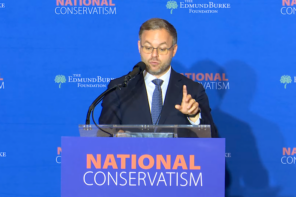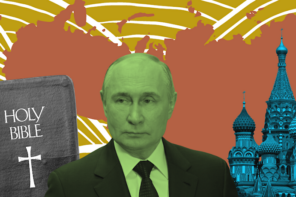Rise in Homophobia Abroad Brings Focus on Asylum for LGBT People
On Capitol Hill on Wednesday, Rep. Mark Takano, co-chair of the Congressional LGBT Equality Caucus, kicked off an event sponsored by the LGBT Faith and Asylum Network (LGBT-FAN), a network of faith leaders, LGBT center staff, LGBT rights advocates, and people who work in refugee settlement. LGBT-FAN works to provide services and find support for asylum-seeking LGBT people who have experienced violence or persecution in their home countries based on their sexual orientation or gender identity. Demand for support services is expected to grow with the adoption of harsh anti-LGBT laws around the globe. Al-Jazeera America, for example, has recently reported on the rising number of Russians seeking asylum in the U.S.
At the Capitol Hill event, activists described the many challenges facing asylum-seekers. For those who make claims when they arrive at a US border crossing, that includes detention, difficulties in accessing legal help, and violence in detention centers. Others who make it into the U.S. face challenges that include a one-year deadline for filing an asylum claim and a six-month prohibition on working after a request is filed.
The Washington Blade also reported this week that Stonewall U.K., the country’s largest gay advocacy group, is devoting more resources to global LGBT rights issues and hopes to hire additional staff to work on the problems facing LGBT people in Russia, Uganda, Eastern Europe, and elsewhere.
India: US Offers Asylum While Exporting Homophobia
Speaking of aslyum, IndiaWest reported last week that an Indian gay couple who had been held for six months in Immigrations and Customs Enforcement detention facilities in El Paso, Texas, were granted asylum in December.
Jagdish Kumar and Sukhwinder Sukhwinder left India in June 2012 and travelled by various means for a year through Dubai, Cyprus and several South and Central American countries before arriving on foot from Mexico at the Texas border. The two had no visas, but immediately applied for political asylum at the border and were taken into Immigration and Customs Enforcement.
“They fled India because they were afraid of violence. They imagined the U.S. to be a welcoming country. Unfortunately, they were detained as soon as they arrived,” Clement Lee, a staff attorney with Immigration Equality, told India-West….
Lee predicted that the Supreme Court decision was “the beginning of a shift of political asylum cases from India,” as gays, lesbians, bisexual and transgender people once again face imprisonment if they are caught engaging in sex. The Indian Supreme Court decision was critical in deciding Kumar and Sukhwinder’s requests for political asylum, he said.
In India, activists continue responding to the recent Supreme Court ruling that re-criminalized homosexuality by throwing out 2009 court ruling against a colonial-era sodomy law. Some of that activism was directed recently toward Change.org, which provides a platform activists can use to create and manage petitions. On Monday, Change.org deleted a wildly inflammatory petition supporting the sodomy ban because it violated Change.org’s guidelines on hate speech. The petition included links to anti-gay materials from American religious right groups and leaders including Paul Cameron, the Traditional Values Coalition and MassResistance. Other anti-gay petitions were also taken down after they were called to Change.org’s attention.
Russia: Orthodox Church Foments Anti-Gay Climate, Finds Itself a Target
“Away from Russia’s biggest cities, being gay means being always under threat,” is the title of a David Tuller story at Buzzfeed. The story describes the spread of anti-gay legislation regionally and the constant threat of persecution:
Beyond the legal minefield, however, the anti-gay campaign appears to have provided sanction for unfettered expressions of anger and hatred toward the LGBT community, without fear of consequences. There are frequent reports from around the country about people being fired for their sexual orientation, being beaten up by anti-gay gangs, or otherwise suffering mistreatment and discrimination.
The role of the Orthodox Church in Russia’s anti-gay culture war is getting more complicated. Writing for Bloomberg, editor and novelist Leonid Bershidsky suggests, “The official homophobia of President Vladimir Putin’s third term in power is threatening to backfire on the Russian Orthodox Church, in whose name the anti-gay campaign began in 2012.”
Bershidsky writes about Deacon Kuraev, an idiosyncratic but popular blogger and “one of the church’s best speakers and most erudite scholars.” Kuraev was removed from the faculty of the Moscow Theological Seminary on December 31 after he wrote a post about a seminary teacher “who was fired for making homosexual advances to students and then transferred to a higher post in another diocese.” Since his firing, Kuraev has launched a public campaign against what he calls a “gay metastasis” in the church. And that, he toldRadio Free Liberty/Radio Europe, could get him defrocked. More from the Bloomberg story:
The Russian Orthodox Church considers homosexuality a grave sin, and Patriarch Kirill has said that the legalization of gay marriage is a “dangerous apocalyptic sign.” This stance encouraged Orthodox Christians in Putin’s United Russia party to propose anti-gay legislative initiatives that crystallized into a law banning “propaganda of non-traditional sexual relations to minors.” Putin, a devout churchgoer, has publicly denounced “so-called tolerance, genderless and without issue.”
Kuraev’s firing from the theological academy only made things worse. The deacon has used his blog for daily attacks on an alleged “gay system” within the church, including a selection of testimonials by former seminarians, altar boys and clerics, who are quoted recalling their sexual encounters with bishops and ranking priests. One related how a bishop “poured almost a full bottle of vodka into me and started pawing me. That stunned me so — I couldn’t even imagine something like that — that I even sobered up.”
According to Bershidsky, Kuraev “is taking a calculated risk:”
He has plenty of supporters among churchgoers. “The cleansing he wants to carry out using his reputation and public status will hurt many people’s reputations and, what’s more, their connections, their finances, their long-term alliances with bureaucrats and law enforcers, who knew everything but covered it up or even used it,” political commentator Alexander Morozov wrote on Facebook. “God will help him.”
The political stakes are high. Once the church and the state agreed it was legitimate to attack gays, they became vulnerable to attempts to prove their hypocrisy. After all, Russia has as many gays in positions of power as any other country, except here they have to nod along with the homophobic official rhetoric.
Meanwhile, a story in the Globe and Mail says that homophobia in Russia “isn’t just about Mr. Putin – or the skinheads, church activists and often-hostile police who show up at Moscow’s occasional gay-rights demonstrations. Opinion polls show that 80 per cent of Russians support the new law – in fact, many want the Kremlin to go much further.” The story by Mark McKinnon traces the rise and fall of anti-gay persecution in Russia from czarist times, when people in power were protected; relaxation during the Boslhevik revolution; a return of persecution under Stalin; and decriminalization after the fall of the Soviet Union.
Six decades later, homosexual acts were decriminalized again after the fall of the Soviet Union, but gays and lesbians remained unsure of their place in society and, according to veteran activists, missed an opportunity when Boris Yeltsin was president to join the mainstream.
“Prominent figures had a chance in the 1990s to create a good example for the common people, and almost everybody missed it,” laments poet Dmitry Kuzmin, who in 1996 published Russia’s first anthology of gay literature.
The story quotes Vsevolod Chaplin, “an Orthodox archpriest responsible for relations between the church, which feels gays are ill and in need of divine forgiveness,” and the Kremlin. Chaplin is “very happy” that Putin is “speaking about the moral dimensions of society.”
Meanwhile, the Principal 6 campaign we wrote about last week has been invited, and has agreed, to sponsor the Australian men’s and women’s bobsled teams, a move that should give it more visibility at the upcoming Olympics in Sochi.
Vatican and Italy: Church Influence Leaves Italian Gays Without Legal Protection
This week the Jesuit journal La Civiltà Cattolica reported on remarks Pope Francis made in November encouraging compassionate treatment of children of same-sex and divorced couples. “We must be careful not to administer a vaccine against faith to them.” In his remarks, Francis recalls that when he was Archbishop of Buenos Aires, he counseled a young girl who was sad because she said her mother’s girlfriend did not like her. But, as Sarah Posner has noted, there may be less there than some LGBT rights advocates want to believe. As the Advocate’s Trudy Ring reports, “Vatican officials quickly took steps to deny that the pope was in any way endorsing same-sex relationships.” Ring also notes, “Recognition of same-sex unions is under debate in Italy, a nation that offers no legal rights or antidiscrimination protections to LGBT people.”
On that front, Henry Chu reports in the Los Angeles Times that Italy is “the only major nation in Western Europe to offer virtually no rights or protections to homosexuals. From a legal standpoint in Italy, gays and lesbians essentially do not exist.” The lack goes beyond relationship recognition to basic anti-discrimination protections or hate-crimes legislation. “Critics cite a fractured and conservative political establishment, a macho culture and the presence and outsized influence of the Vatican for Italy’s laggardly approach to gay rights.”
The story explores the tragic consequences of that lack of protection, including a series of youth suicides in Rome last year, and quotes an openly gay regional governor from the “supposedly more traditional south” saying he was afraid to walk at night in Rome because of potential gay-bashing. Still, the story says, life for gay people in Rome and other large cities is easier than for those in small towns and rural villages.
Chile: Civil Unions Bill Approved by Legislative Committee
On Tuesday, a bill to allow same-sex couples to enter into civil unions got a 28-6 vote to advance from a Senate committee, reports the Washington Blade’s Michael Lavers. The vote generated religious opposition:
Opponents of the civil unions measure held signs inside the Senate chamber that said “Return to Christ.”
Oscar Rementería, spokesperson for the Movement for Homosexual Integration and Liberation, a Chilean LGBT advocacy group, said on Twitter that police had to remove a “belligerent” Evangelical pastor and his supporters from the Senate chamber. Lawmakers who voted against the measure and other opponents also reacted angrily after the vote.
Last July, Lavers reports, the Inter-American Court of Human Rights asked the Chilean government to respond to a lawsuit filed on behalf of three same-sex couples who had been denied marriage licenses. Michelle Bachelet, Chile’s president-elect, is a supporter of marriage equality.
South Africa: “Corrective Rape” on Rise?
UK’s Independent published a story this week on violent “corrective rape” against lesbians in South Africa. The story is based on two years of reporting by photographer Clare Carter. “Even in the two years I was there the stories I was hearing were getting worse,” Carter told the Independent. “Corrective rape is getting more violent.” According to the story, family members often cooperate in sometimes repeated rapes, and law enforcement often responds with a shrug. The story quotes Funda Soldaat, who runs a shoe-string support organization called Free Gender:
“Even if you know how the constitution works, you don’t know how to use it to protect yourself. If you don’t have money you don’t have access to the justice system. Violence in the townships is normal. Homosexuality is [seen as] un-African. Patriarchy is everywhere. The way religious leaders read scripture is painful. Children start raping at 14, 15 and take pictures. We’re sitting on a time bomb.”
One strong voice in opposition to such violence is Anglican Archbishop Thabo Cecil Makgoba, who said in a video produced by Human Rights Watch last fall, “When you violate somebody on the basis of difference, you are not only violating them, but you are demeaning yourself…it’s a moral responsibility to stop the violence against people who are different.” Said Makgoba, “God has not called us to judge, but God has called us to radiate his love and grace in the world.”
Israel: Friday Ceremony for Monument to LGBT Holocaust Victims
A new monument commemorating LGBT victims of the Nazi regime will be officially unveiled in a ceremony on Friday, January 10 in Tel Aviv-Jaffa, reports the Jerusalem Post (h/t Bilerico’s John Becker).
The new monument will be mounted outside the Municipal LGBT Community Center in Meir Park (Gan Meir) which serves as the city’s main hub of activity for the LGBT community.
The monument will be shaped in the form of a pink triangle, reminiscent of the pink triangles LGBT community members were required to attach to their clothes in the concentration camps, and will feature short texts in Hebrew, English and German….
In statement on Monday, Tel Aviv mayor Ron Huldai said, “This monument reminds us all how important it is for us to respect every human being. It is only natural that such a reminder will exist in Tel Aviv-Yafo – a city that warmly embraces all groups and minorities.”
Haaretz reported last month on the construction of the memorial park.
Hong Kong: Polls Show Widespread Support for LGBT Rights, Not Marriage Equality
Researchers from the University of Hong Kong released polling data that showed strong public support for moves toward greater LGBT equality, but only 27 percent support for allowing same-sex couples to legally marry. Three quarters of respondents said they supported hospital visitation, protection from housing discrimination, and inheritance rights.




